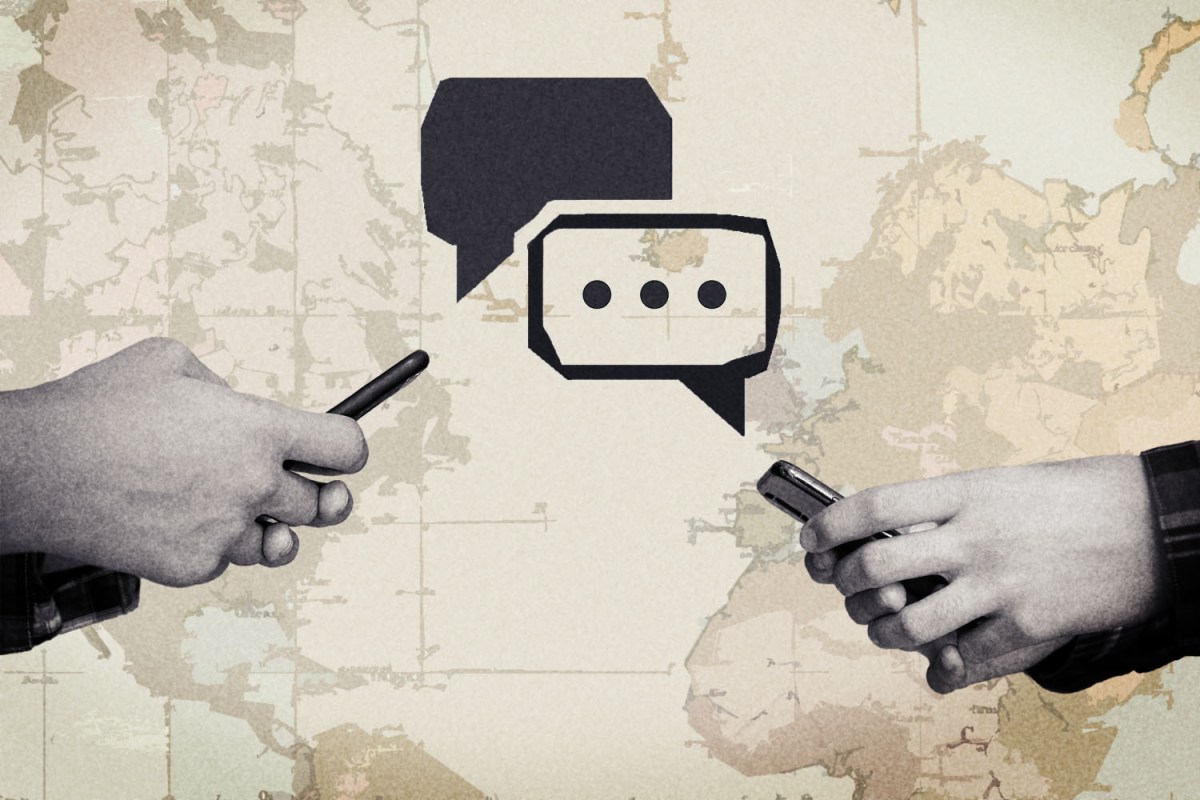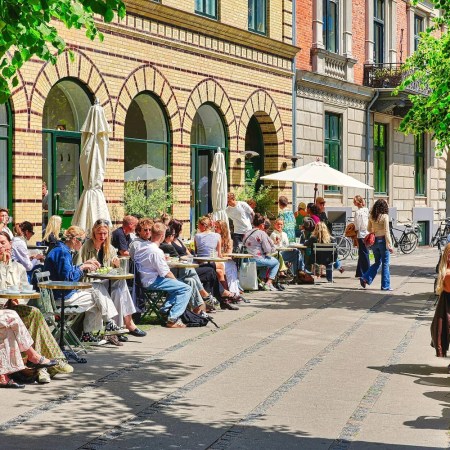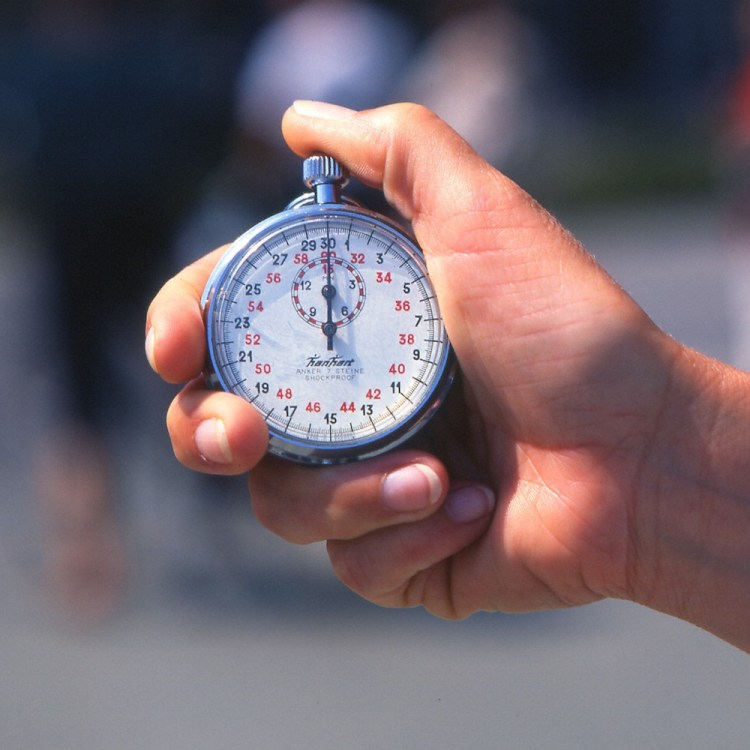I was out with a coworker named Michael one night, splitting nachos or something, when he referenced Ezra, a friend I’d heard about more than a few times before. I usually equated the name with stories of Michael’s postgrad knockaround years, and while it was clear that they were no longer hanging out every weekend, I understood them to still be extremely close. So I was shocked when Michael casually revealed, for the very first time, that he hadn’t actually seen Ezra in 15 years.
This made zero sense to me. The last time Michael had physically seen one of his best friends was three presidents ago. And yet today, here in 2024, my coworker still corresponds with Ezra every single day. They’re in a group chat with another friend (who my coworker does see regularly), which pops off every day with takes on movies, sports and general nonsense. Michael shared me on a recent screenshot: this week’s slate included takes on John Leguizamo and Tiger Woods.
Offering a little more context, Michael tells me, “We’re not talking about life and love and our hopes and dreams. We’re shooting the shit about our top five Spielberg movies. It’s a consistent and never-ending conversation that’s really nice to have, even if my wife continues to insist that Ezra doesn’t exist.”
For years, therapists and researchers have weighed in on the male “friendship crisis,” a trend that most acutely intersects with cisgender, heterosexual men. This demographic of men tends to have very few friends; they lose many as they get older and start families; they have trouble making new ones; and they often rely on “couple friends” — the significant others of their significant other’s best friends — in order to maintain some semblance of a social network outside of work.
Earlier this year, SNL spoofed the somewhat startling dependency middle-aged men foist upon their partners with a skit called “Man Park.” Heidi Gardner’s character explains: “When I walk through the door my husband sort of rockets information at me for 25 minutes straight… All the words come out fast and in the wrong order because he hasn’t spoken to anyone else that day.” The solution: a dog park for men, where guys can greet each other with the words “Rise and grind,” hike footballs, pour IPAs from a public fountain, talk about Vin Diesel and sing “Mr. Brightside.”
It all sounds absurd, but loneliness is serious business. According to a report from the American Perspective Survey, “more than one in four (28 percent) men under the age of 30 report having no close social connections.” Consider: if you’re heading in to your thirties with zero confidants to your name, what will your social circle possibly look like at 40? And can you really find time to dust off forgotten friendships, when you’re angling for a promotion or looking to spend more time with your kids?
It’s easy for men to take constant companionship for granted while growing up. The social infrastructure is sound — with teams, camps, gyms, fraternities all readily available — but then, so is the casual, consistent tendency to fall into afternoons spent with “the guys.” Why do people love rewatching The Sandlot? It isn’t all about baseball. It’s the reminder of unscripted days, where the single guarantee is time around others.
Last year, we spoke with psychologist, award-winning author and national speaker Dr. Frank Sileo, who’s been studying the male friendship dilemma for decades. He boils the crisis down to an unfortunate (and toxic masculinity-driven) aversion to intimacy. “Men aren’t really great about expressing how they feel,” he said. “And when they do, they feel that they [seem] weak. So men, who are more restrictive in their emotional expression, tend to have less intimate and close friendships.”
It isn’t all that hyperbolic to call the trend a “crisis,” either. People with more (and more powerful) social connections don’t just exhibit robust mental health. They’re physically healthier, too, displaying lower blood pressure and a capacity to live up to 22% longer. When I assembled InsideHook’s massive longevity guide last year — 100 Ways to Live to 100 — one persistent theme among the planet’s centenarians was a sense of belonging.
Well-aging folks aren’t so well-adjusted simply because they eat leafy greens and walk a mile each day. These are people who have people to talk to. They’re part of long-held, reciprocal relationships — which exist well outside of work, and often outside of the family too. Ever seen a bunch of Sicilian men chumming around a bocce court? Yeah. That. Shooting the shit doesn’t feel like much when it’s happening. But the second it’s gone, and the silence creeps in, you realize just how valuable it was in neutralizing the doldrum of your days and preserving the plasticity of your mind.
If the pandemic taught us anything, it’s that we can’t always rely on the physical world to provide the comfort of companionship. And that’s on top of the usual mores of adult living, which can already make seeing friends — even those who live in or around the same city — an all-too-rare experience. All told, that makes this as crucial a time as any to A) preserve your existing friendships over text, calls and FaceTime, and B) recognize that that sort of engagement absolutely counts as friendship.
Dan, an online expert in backyard equipment, has an Ezra of his own. “My mate Jim, whom I went to college with and lived with for many years, moved away about five years ago.” Jim moved pretty far (about three hours by air) and Dan says he hasn’t actually seen his friend in person for over two years. “We were best buddies and went through a lot of those important milestones together… We were in many of the same classes at college, we met the women who would become our wives around the same time, we got married within a few months of each other, and had our first and second kids about the same time.”
Still, they’re constantly in touch: “Some days it’s just sharing a meme, a quick comment, or a photo of what we’re up to, but often it’s a decent text conversation.” While Dan hopes they can see each other again at some point this year, so their kids can get to know each other, he isn’t worried that the friendship will fall to the wayside. “What keeps the relationship going, I think, is the years of shared experiences beforehand. We traveled a lot together, had a ton of adventures, have been through good and bad times together, and we see the world similarly.”
Some “digital friendships,” as with a different Jim (who works as a speech counselor) and his old college friend, court a deeper bond than sharing links from the internet. Jim considers his friend a crucial outlet, which is really saying something, considering they live on different continents.
“Life separated us after college. He moved to another country to search for a job opportunity. We weren’t close geographically, but we started messaging daily. He was always a person of trust for me, and he understood some things that my other friends or family couldn’t understand. We could talk about everything, and after he moved to another continent, that bond between us actually started to grow stronger. When I exchange messages with him, it feels like escaping from reality. I think it’s the same for him. It’s nice to have a person who isn’t in your environment. It’s easier that way. You feel more relaxed. At least that’s I feel. He’s able to give you the best possible advice.”
Of all the men I spoke to who maintain a digital friendship, not one feels nervous about the prospect of potentially seeing their friend for the first time in many years. As they see it, this person might as well live across the street. With such constant correspondence — and for many, it takes place over FaceTime or Zoom, in which case either party is attuned to the other’s changes in physical appearance — they genuinely feel as if they’ve spent every week of every month with their friends, in one way or another. This might explain why it didn’t occur to Michael to mention that he hadn’t seen Ezra in 15 years. He hardly even thought about it.
It’s a rather unexpected conclusion, coming off the last two years, that men should spend more minutes of the day tapping away at screens. Especially when men typically crave what some psychologists refer to as a “side to side” relationship dynamic. (Men like sitting next to each other at bars, golfing next to each other on greens, running next to each other on trails.) Shouldn’t men vaunt in-person interaction as the Platonic ideal of social networking? Wouldn’t it be wise to engage with real world events instead of clinging to old buddies who live too far away and have too many kids?
Well, that’s the whole point — it’s sort of up to you. There is no right answer for how you should allot your time and energy to the friendships in your life. But the wrong answer would be affording no time to either the guys down the road or the guys on the other side of the world. Social connection, in whatever medium it may arrive, is absolutely critical to your longterm mental and physical health. If the the attention, wisdom or tomfoolery that gets you through the day comes predominantly transmutes via an icon on your phone, there is nothing wrong with that. In fact, it’s sort of a big win for mankind — and especially for the men who make up mankind.
The Charge will help you move better, think clearer and stay in the game longer. Subscribe to our wellness newsletter today.

























